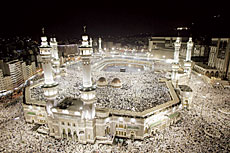Islam - The Religion From God
Ar-Rahman Ar-Raheem
- Details
- Hits: 22383
الرحمن الرحيم
The most common translation of this ayah is, “The Most beneficent, The Most Merciful.” In contemporary context, such a translation almost fails its purpose as those English words are seldom used in normal speech and literature, let alone being properly understood. Fundamentally, the translation is accurate as the Arabic refers to Mercy, however both arRahman and ar-Raheem are derivatives of Mercy. This is why one needs to understand properly why they are different. Generally speaking, when synonyms are used in the same sentence in Arabic, they are intended to join their unique qualities. Similar, is the case here. Both those words have Rahmah in their roots.
Rahmah means mercy in Arabic, and has also been used as ‘womb’ of the mother. This is from the Arab idea of mercy in the womb of the mother, where the foetus has no worries and all its needs are taken care of by the mother--- hence the child is under the mercy of the mother, from every angle. However, since they are used together, they bring their own qualities to this ayah.
Ahad - The One and Only
- Details
- Hits: 55565
أَحَد
The One and Only.
Fourteen hundred years ago, the polytheists and Jews in Arabia asked Prophet Muhammad (s.a.a.w.) questions about God. Some of these questions were:
Tell us of your Lord's ancestery.
O Muhammad, tell us attributes of your Lord, who has sent you as prophet.
What is your Lord made of?
Is He made of gold, silver, iron or what?
Does He belong to a race of Gods?
Does He have parents or children?
Who will inherit the earth after Him?
The answer came in the following verse of the Holy Quran:
قُلْ هُوَ اللَّهُ أَحَدٌ
Say: "He is Allah, the One and Only.” (The Holy Quran, Surah Al-Ikhlas, Ayah 1, 112:1)
Let us first analyze the sentence, “ Huwa-Allahu Ahad”, هُوَ ٱللَّهُ أَحَدٌ lexically.
In this sentence, Huwa is the subject (mubtada) and Allahu its predicate (its khabar), and Ahad-un its second predicate (second khabar). According to this parsing the sentence means: "He (about Whom you are questioning me) is Allah, the One and Only.” Another meaning according to the language rules can be, "He is AIIah, the One."
Abraham confounds Nimrod
- Details
- Hits: 14643
About four thousand years ago, Abraham (peace be on him) is brought to the court of the king Nimrod. A dialogue takes place between the two and the King is abashed.
أَلَمْ تَرَ إِلَى الَّذِي حَآجَّ إِبْرَاهِيمَ فِي رِبِّهِ أَنْ آتَاهُ اللّهُ الْمُلْكَ إِذْ قَالَ إِبْرَاهِيمُ رَبِّيَ الَّذِي يُحْيِـي وَيُمِيتُ قَالَ أَنَا أُحْيِـي وَأُمِيتُ قَالَ إِبْرَاهِيمُ فَإِنَّ اللّهَ يَأْتِي بِالشَّمْسِ مِنَ الْمَشْرِقِ فَأْتِ بِهَا مِنَ الْمَغْرِبِ فَبُهِتَ الَّذِي كَفَرَ وَاللّهُ لاَ يَهْدِي الْقَوْمَ الظَّالِمِينَ
002.258 Bethink thee of him who had an argument with Abraham about his Lord, because Allah had given him the kingdom; how, when Abraham said: My Lord is He Who giveth life and causeth death, he answered: I give life and cause death. Abraham said: Lo! Allah causeth the sun to rise in the East, so do thou cause it to come up from the West. Thus was the disbeliever abashed. And Allah guideth not wrongdoing folk.
The whole story occurs in the Talmud and is largely in harmony with the Qur'anic version. In the Talmudic version it is said that the father of Abraham occupied the highest office in Nimrod's government. When Abraham denounced polytheism, preached the doctrine of the oneness of God and smashed the idols of the temple, his own father lodged a complaint against him before the king. This was followed by a conversation which is mentioned here.
A Selection of articles for this moment that may interest you
- Three Who Were Tried on Wealth
- The life of the Prophet after prophecy by Al `Uthaimeen
- Concept of Reward and Punishment
- Two Levels of Faith
- The First, The Last, The Evident and The Immanent
- Prophet's Utmost Trust in Allah
- Refuge From Creatures
- Genuine Prophets Preach Only Islam
- The Son Of Man According To The Jewish Apocalypses
- Gheebah (Backbiting)
